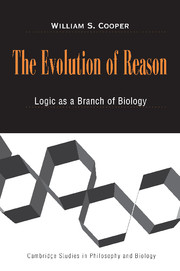Book contents
- Frontmatter
- Contents
- Foreword
- 1 The Biology of Logic
- 2 The Evolutionary Derivation of Life-History Strategy Theory
- 3 The Evolutionary Derivation of Decision Logic
- 4 The Evolutionary Derivation of Inductive Logic (Part I)
- 5 The Evolutionary Derivation of Deductive Logic
- 6 The Evolutionary Derivation of Inductive Logic (Part II)
- 7 The Evolutionary Derivation of Mathematics
- 8 Broadening the Evolutionary Foundation of Classical Logic
- 9 The Evolutionary Derivation of Nonclassical Logics
- 10 Radical Reductionism in Logic
- 11 Toward a Unified Science of Reason
- Appendix: Formal Theory
- References
- Index
2 - The Evolutionary Derivation of Life-History Strategy Theory
Published online by Cambridge University Press: 18 December 2009
- Frontmatter
- Contents
- Foreword
- 1 The Biology of Logic
- 2 The Evolutionary Derivation of Life-History Strategy Theory
- 3 The Evolutionary Derivation of Decision Logic
- 4 The Evolutionary Derivation of Inductive Logic (Part I)
- 5 The Evolutionary Derivation of Deductive Logic
- 6 The Evolutionary Derivation of Inductive Logic (Part II)
- 7 The Evolutionary Derivation of Mathematics
- 8 Broadening the Evolutionary Foundation of Classical Logic
- 9 The Evolutionary Derivation of Nonclassical Logics
- 10 Radical Reductionism in Logic
- 11 Toward a Unified Science of Reason
- Appendix: Formal Theory
- References
- Index
Summary
The thrust of the Reducibility Thesis is that upon pursuing the implications of evolutionary principles far enough one arrives at laws of logic. The evolutionary considerations are asserted to give rise to the logical rules themselves, not merely to a tendency for organisms to obey externally imposed logical rules of mysterious origin. To demonstrate the thesis the logical theory must be extracted directly from the evolutionary theory. In so doing, care must be taken that the logic does not somehow get smuggled in the back door. It must be clear that the logic can be developed as an inherent part of evolutionary theory until the logic stands complete as an entity of biological origin.
The task of this chapter is to prepare the ground for that enterprise by reconstructing a portion of evolutionary theory to the point where it can serve as a platform on which to erect logical systems. But first let us look ahead at where this line of exploration will lead.
THE LADDER OF REDUCIBILITY
Can one start out with evolutionary theory and, by carefully drawing out its consequences, end up deriving systems of logic? We will try to show that this can indeed be accomplished in a chain of reductive reasoning involving several stages of ascent. An attempt has been made to make the stages correspond more or less to familiar bodies of theory in biology and logic.
Figure 2.1 shows the ladder of reductive relationships. The upward-pointing arrows on the left indicate implicative relationships.
- Type
- Chapter
- Information
- The Evolution of ReasonLogic as a Branch of Biology, pp. 19 - 42Publisher: Cambridge University PressPrint publication year: 2001

